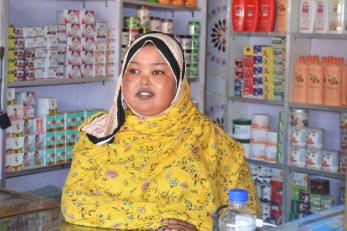Financial Services in the Lowlands of Ethiopia
The Impact of Multi-phase USAID Investments

Inclusive and effective financial services are a key cross-cutting resilience capacity for households and businesses, not least in shock-prone contexts such as the lowlands of Ethiopia. In 2010, when Mercy Corps began working to strengthen financial systems in Somali and Afar regions, where financial services were almost non-existent, presenting a major constraint to economic growth, job creation and resilience. This learning brief describes how USAID resilience investments over more than a decade have enabled Mercy Corps to play a key role in transforming financial services in the lowlands, specifically through enabling three distinct iterations of partnership and innovation. The brief highlights the impressive reach that financial institutions have achieved, including the latest innovations in digital credit services, but also the challenges faced in the Afar region.
Approach
In the course of 15 years of USAID-funded resilience programmes in the lowlands, Mercy Corps has implemented three distinct phases of partnerships with financial institutions, with each iteration building on the achievements of the previous phase to respond to new opportunities and needs:
- Phase One: Introduction and expansion of basic financial services.
- Phase Two: Introduction and expansion of basic digital financial services (mobile money).
- Phase Three: Comprehensive digital transformation in saving and credit services.
Key Achievements and Indicators of Success
- Partner institutions now have 107 branches in the lowlands, with 297,000 savings clients and 80,000 loan clients
- 1.2 million individuals using partner institution Mobile Money (MM) services, served by 8,000+ mobile money agents
- Partners were ‘first-movers’ in key innovations with subsequent crowding-in / market entry resulting in seven Islamic Finance institutions and six mobile money service providers in the lowlands
- 60% of households in RIPA-North areas have savings, compared with 17% in non-RIPA ‘control’ areas
- $80 million of daily transactions through Mercy Corps’ partner institution MM platforms, in Somali Region alone.
- Average 83% revenue growth in MSEs accessing digital loans and 15,000+ jobs created in these businesses.
- Integration of gender into partnerships contributed to an increase in proportion of female MM clients from 23% in 2020 to 32% today, and more than 50% of digital loans clients are women.
Selected Lessons Learned and Recommendations
- Multi-phase programming has provided a unique opportunity to iterate and build on past approaches, and this has enabled Mercy Corps to achieve highly transformative and innovative solutions in financial systems.
- Digital financial services can reach new and previously marginalised demographics with the right marketing approaches, for example 52% of digital loan clients are women and 74% had never received a loan before.
- Focusing on just one financial institution partner in Afar region was risky given the fragility of the context and the weakness of the institution. Establishing two partnerships is a better strategy in such contexts, as it reduces risk of failure, creates healthy competition, and the successes of one institution become the ambitions of the other.
- Loans to agricultural market system actors such as traders and retailers have not yet taken off, and in future Mercy Corps should consider more deliberate mechanisms for financing these catalytic actors.
- Financial services are complex systems and achieving sustainable systemic change takes time and expertise. Mercy Corps’ successes were driven by sector leaders with first-hand financial services experience and achieved through relationships built over many years.

